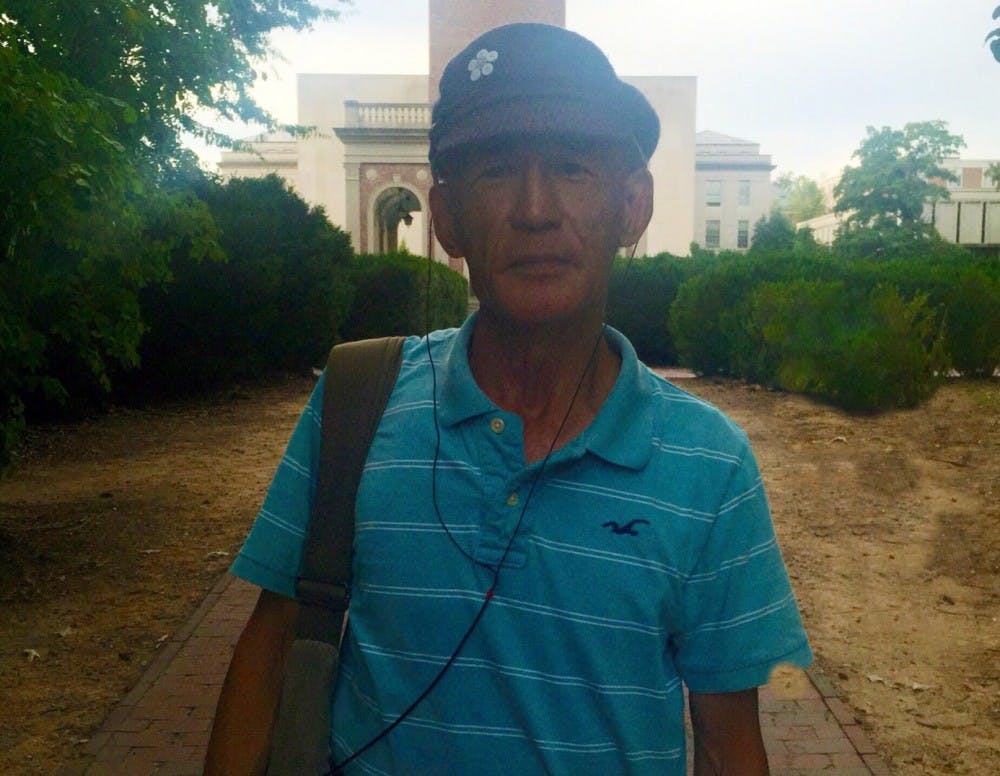Last Wednesday afternoon, I was rushing to class (running five minutes late, as usual) when suddenly I found myself hypnotized by the sound of slow, dreamy whistling floating toward me from up ahead.
The effect was like that of a siren’s voice on sailors, and the melody immediately put me into a trance. Following the source of the music, I turned the corner to exit Kenan Stadium and found myself crossing paths with the famous UNC Campus Whistler.
A man of average height and medium stature dressed in khaki pants and an American Eagle button-up, one might not expect anything out of the ordinary, but his tunes were unlike that of anything else I have ever heard.
At first I passed by, letting his tune fade into the distance. But before I knew what I was doing, I was running back, forgetting my schedule and desperate to discover the story behind such a mystical sound.
I found him crossing beneath the Bell Tower and called out, “Excuse me!” but my voice was lost to his headphones. Out of breath, I ran up and introduced myself as a writer for the DTH, beginning what was originally meant to be a quick and simple interview.
What I found in this man was far beyond my expectations.
Originally from Taiwan, the Whistler came to the United States with his family 40 years ago in search of better educational opportunities and a better life. He planned to eventually travel to Italy, but after moving from Los Angeles to Chapel Hill, he found that he enjoyed the town so much he decided to stay (and in fact, had two daughters, the youngest of whom graduated from UNC just two years ago).
The Whistler opts to go by the self-selected American name Gregory Peck after the Oscar-winning actor who portrayed lawyer Atticus Finch in the 1962 film version of Harper Lee's To Kill A Mockingbird.
“Do you know why I honor him?” he said.
“Because he's a gentleman. Simply because he is a gentleman. I see myself in him. And I like him very much.”
To place further importance on honoring and aspiring to be like others through one's name, he added that he often also refers to himself by the German name "der Wanderer", as he is constantly searching for a “pool of hope” and for the truth in the universe.
"When you have peace within you, use your mind, listen (to) your heart. All the answers (are) within you. You can see everything," Peck said.
When I asked about how his interest in music began, he smiled fondly and looked back on his childhood.
“When I was small … (in the) first grade I went to my classmate’s house (to) play, and suddenly I heard opera broadcasting from the portable radio. And I stood there for (an) hour listening … heavenly. In that time, I had just one thought in my mind …when I grow up, I’m going to find out how they produce that beautiful voice,” he said.
Describing music as his “best friend”, the Whistler explained that he found starting out in music frustrating. Entirely self-taught, he persisted and practiced whistling in order to express his passion and discover his “voice."
Even after a lifetime of loving music, however, he still cannot choose a single song that he loves the most because he says he has learned so many beautiful pieces of music over time.
“From Russian romance, Germany to French melody chansons, Italian canzone, Spanish canción, Sweden, Norwegian, Finnish, Argentina … even Tango, very passionate, you know?” Peck said.
We also discussed why he opts for whistling rather than singing. He said that because singing opera might scare people away, whistling was a good alternative; however, he has also found that whistling can give one access to more vocal ranges than singing can.
“I learned the techniques from soprano to bass … if you are tenor, you only sing the tenor, you know, repertoire … but whistling, I can cross the border and learn everything,” he said.
The Whistler is a strong believer in self-expression, and several times throughout our discussion he mentioned to me the importance of staying true to oneself and being open to the expression of one's thoughts, feelings and emotions. He repeatedly spoke highly of being unafraid to speak one’s mind, using his own confidence as an example.
“I stand out from the crowd. I’m free-minded. That is a gift. I don’t judge people. I’m not afraid (of) people laughing at me, (judging) me, putting a name on me. I let it pass," Peck said.
At this point, I was 20 minutes late to class, but after speaking with the man responsible for what might be the most enchanting music on campus, I felt that I was 20 years wiser.
And his final piece of advice to me?
"When you have peace, you have truth. When you have truth, you have wisdom … if you speak from your heart, it will always be very powerful.”
To get the day's news and headlines in your inbox each morning, sign up for our email newsletters.




